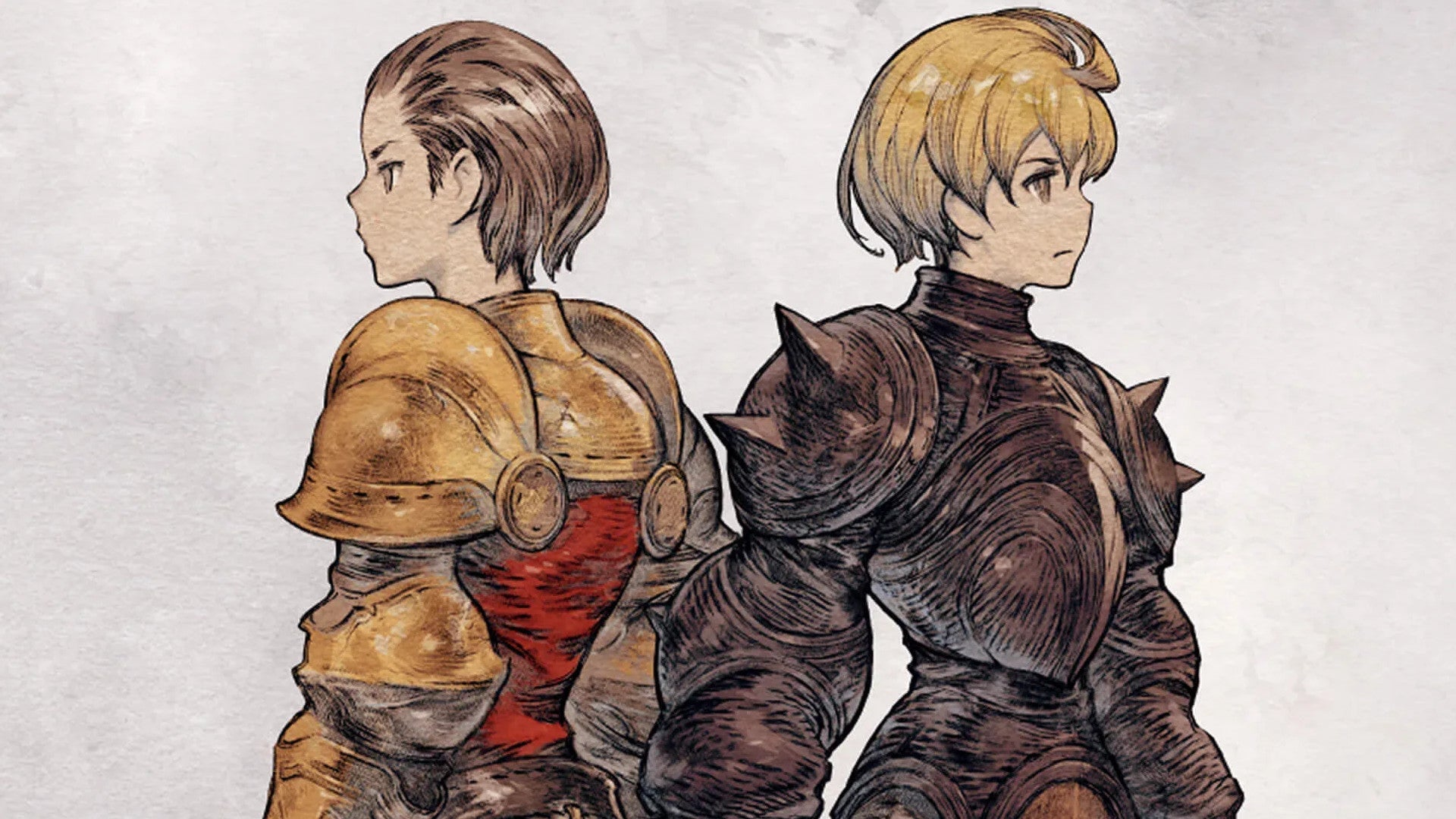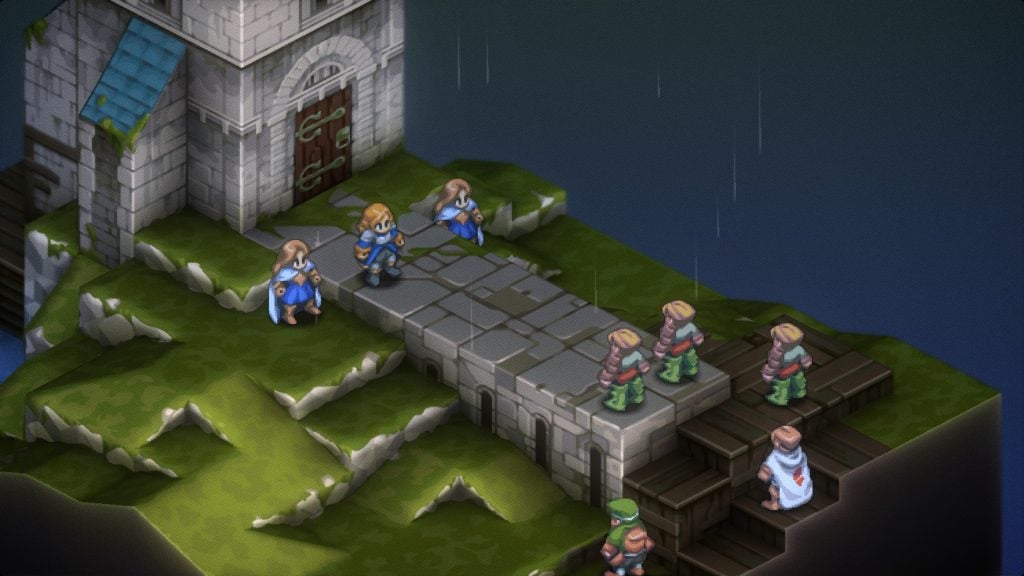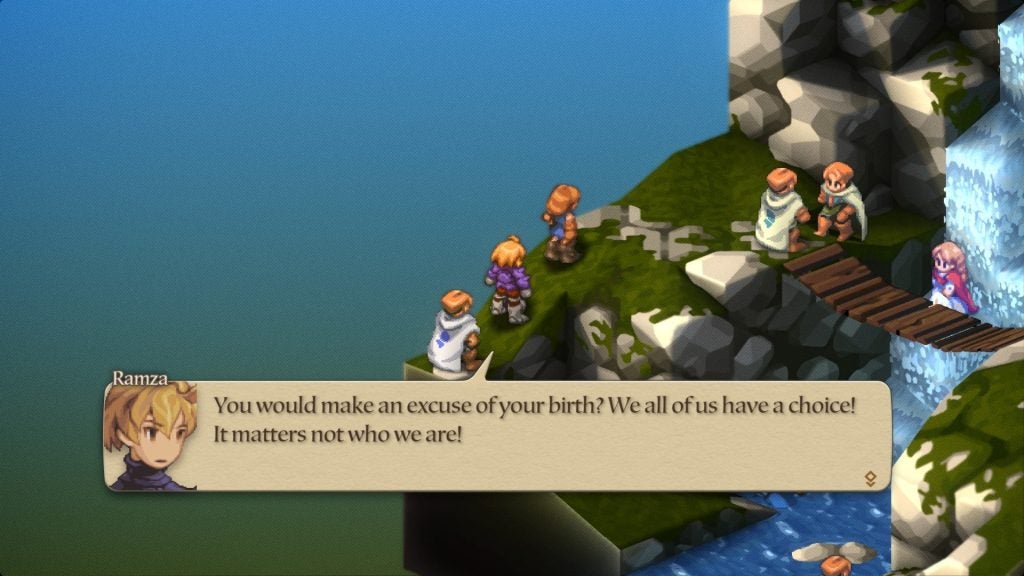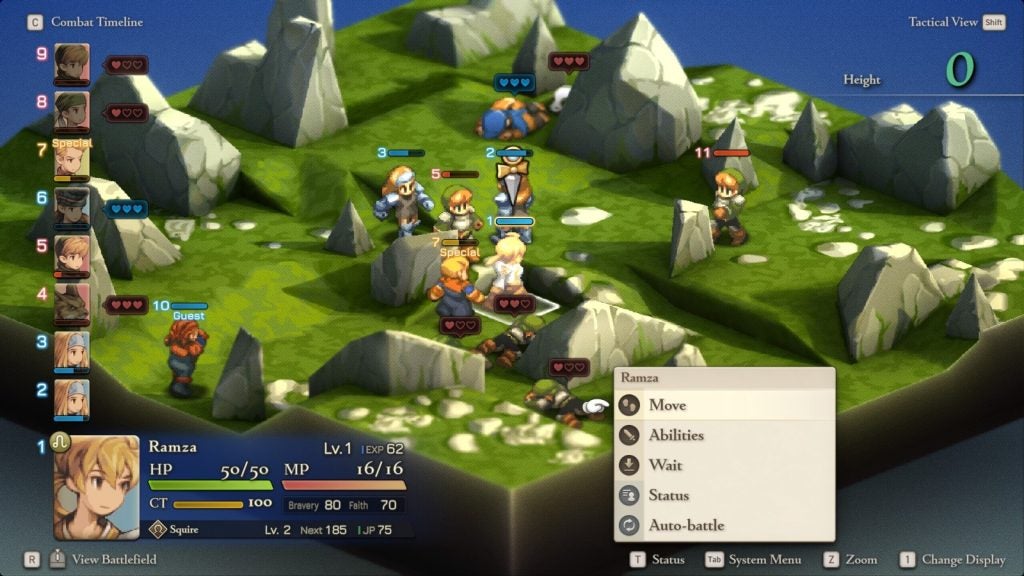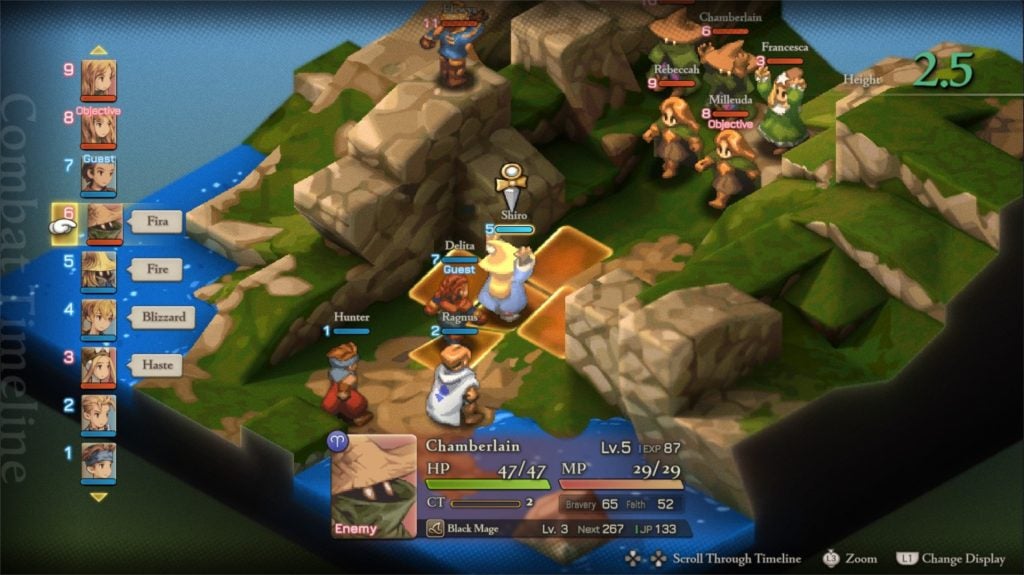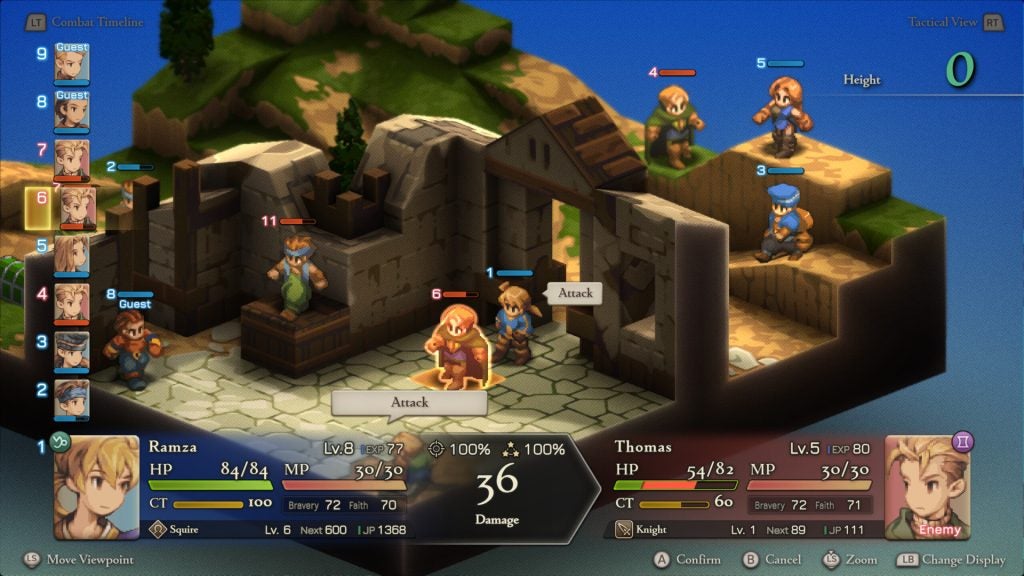I had this sort of a blank spot on what I like to call my “Strategy RPG (SRPG) history”: Final Fantasy Tactics. I played a bit of it back in the PlayStation 1 days but soft locked myself in a battle. Fast forward many years and I finally reached the ending in “War of the Lions” — the PSP re-release with added content and cinematics. I didn’t think much of it back then, it was a very good SRPG, but as someone who grew up playing PC games, especially Heroes of Might & Magic, it wasn’t my favorite “flavor” so to speak. It took me almost 20 years, and another part re-release, part remaster “Final Fantasy Tactics – The Ivalice Chronicles”, to finally understand how brilliant it is.
But, before I start babbling about how much I love it, let me set the stage. You take on the role of Ramza, a young man coming from a prestigious family. Once he was a promising squire who, alongside his friend Delita, vowed to defend their kingdom. However, a series of events force both to confront harsh realities about their kingdom, the consequences of war, how a society is structured, how religion affects one’s view of the world, and the toll death takes on someone.
My apologies if I sound a bit nebulous when talking about the “Final Fantasy Tactics” story, I don’t want to give out too much information. It’s one of those very rare titles that you must play to watch the story unfold. No amount of summaries, recaps or “story rundowns” can convey how gripping it is. You will cling to every written word, scenes will leave your mouth ajar, you will hate characters. You will cheer for others. You will feel their pain.
And, although it was released in 1997, the themes that drive the plot of “Final Fantasy Tactics” remain extremely relevant in today’s world. I’d dare say even more so with ongoing conflicts like the Israeli attacks on Palestine, the current state of world politics, and how living in 2025 feels like one battle after another.
Themes such as the ones established in Final Fantasy Tactics are no stranger to Yasumi Matsuno – the game lead scenario and writer. They can be seen throughout his career also in games such as “Tactics Ogre”, “Ogre Battle” and “Final Fantasy XII”. But it is the world of Ivalice – also shared with the aforementioned “Final Fantasy XII” and “Vagrant Story” – that really stuck with me.
It is hard to find a world so immersive, so rich in details as the world of “Final Fantasy Tactics”. Be it through in-battle narrative, rumors that you can pick up in random taverns or errands that act almost like side quests.
It can be overwhelming, and the new release makes a bit easier to digest thanks to a renewed “Chronicle” menu – which keeps all the relevant information in one place – and also a “State of the World” tab, that “tracks” where every major character is, where they are going or what happened to them. Although the PlayStation 1 version had a “record” system, “Final Fantasy Tactics – The Ivalice Chronicles” greatly expands it with locations, events and even a way to re-watch pivotal scenes. A great quality-of-life addition for those, like myself, who tend to play for hours between jobs and have to stop for a week or more.
“Quality-of-Life” is what sets “Final Fantasy Tactics – The Ivalice Chronicles” apart from other remasters, even ones published by Square Enix.
On the gameplay side, battles have greatly improved both in readability — allowing you to use a quasi-top-down view making it easier to plan your attacks, flank an enemy, or use height to your advantage, Square Enix also included a turn order view — which to me is the biggest and best inclusion. I yearned for this feature for years ever since it became commonplace in SRPGs, and the more I played newer SRPGs, the harder it was to go back to “Final Fantasy Tactics”.
Outside of battle there is now a proper job tree which helps plan your team accordingly, which jobs they can take and which level they need to be to change jobs. And if you’re wondering “why would I need that”, reader, you have no idea what you’re getting into.
If there is one key aspect that sets “Final Fantasy Tactics” apart from other SPRGs, it is its job system. Jobs have been a staple of the Final Fantasy Franchise for decades, with mainline entries such as “Final Fantasy V” and “Final Fantasy XII” making a great use of it, where others take a more “simplified” approach such as “Final Fantasy VII”. My favorite one is, by far, the one employed by “Final Fantasy Tactics”.
Do you know when a game goes “If you can think about it, you can probably make it happen”? That’s how the job system in “Final Fantasy Tactics” works. The depth in which you can customize your party, create synergies, unlock new jobs — for reference, there are around 20 jobs — pretty much “break” the game is nothing short of astonishing. It’s the tactician’s dream game — if you’re willing to put in the work, of course.
I had sessions where I spent hours getting into random battles — which in “Final Fantasy Tactics – The Ivalice Chronicles” are optional and it can be “searched” in most nodes of the map — leveling up my party and assigning specific jobs. Equipment matters, positioning matters, everything matters. Even the date of birth of a character defines their stats and how they will evolve.
I’m not going to shy away from the fact that, yes, “Final Fantasy Tactics” is a brutal game. Even with a lot of “Quality of Life” features, the pace in which he goes “here’s a tutorial on how to move your character and attack” to “here’s a battle in which you are outnumbered” is daunting. It was one of the reasons I soft locked myself in the original version — besides the fact that English isn’t my native language, and I was 9 years old when I played it.
The game isn’t afraid to throw you in the deep end and make you fight for your life. If it was another game, such as “Disgaea” – another favorite of mine – I would dare to complain. But the battles, for most of the time, feel so much like an extension of what’s happening in the world of Ivalice, that each movement you make, each attack you do or don’t is crucial — much like the stakes of the main story. Yes, they are that high. It is horrifying, stressful, it needs to be, and I wouldn’t have it any other way.
“Final Fantasy Tactics – The Ivalice Chronicles” mitigates that in multiple ways: Autosaves and multiple save slots regardless of your platform of choice, tweaks to certain job requirements and skills values, and a new easier difficulty option (Squire).
While I am partial to playing on the default difficulty, I do recommend that if you’re either a newcomer or not that versed on the job system to play in “Squire” mode. You won’t be missing much and will still be able to enjoy the story to its full glory. If you get a good grasp of the systems, you can change it back to “Knight” – the default difficulty – or try your luck in Tactician.
With that said, I still have some quibbles about things that Square Enix could’ve handled better with “The Ivalice Chronicles”. Although I like the new voice over and I do understand why it is there, it feels a bit redundant. It takes away a bit of the charm of the script. The voice actors do a fantastic job of portraying the main characters, but I like my own interpretation of their voices. But then again, I’ve been playing “Final Fantasy Tactics” on and off for more than a decade.
The biggest issue is how the previously mentioned random battles still work. Enemies in random encounters will be set to a range that’s based on whichever character in your roster (whether deployed or not) has the highest Level.
So, if Ramza is level 10, the enemies will scale based on Ramza instead of the party you have on the battlefield. Good luck leveling up level 1 characters and unlocking jobs for them. Saying that it takes “a lot of planning” to pull it off is being, very, very gentle. There is a lot more than only “levels”, there are job experience points, multiple ways to gain (or lose) experience points. I won’t bother you with the details, otherwise this review will become so long it will have a mind of its own.
Heck, no wonder I ended up with a spreadsheet with all my character stats and calculations on whether or not they will have the requirements for a specific job. Mind you, this is not necessary, this is me being overkill in my party composition and I do this with pretty much every SRPG.
And if you are one of those “purists”, I have great news for you: You can play the “classic” version of “Final Fantasy Tactics” inside “The Ivalice Chronicles”. There are very few quality-of-life additions, such as support for every type of controller, but the game remains largely untouched with the exception of the usage of “War of the Lions” much improved translation script. This feature should be a must-have for any remaster, and it baffles me that most games don’t even bother packaging the original version.
With all said and done, it’s hard not to say “Final Fantasy Tactics – The Ivalice Chronicles” is the definitive version of the SRPG. A masterclass in storytelling, a compelling battle system, memorable characters and a plot that feels ever so relevant in this day and age. This is not only a must for SRPG fans, but Final Fantasy fans in general and ones interested in delving into the story of turn based games.
May you be relentless in your pursuit for justice and your blade sharp. Trust me, you will need it.
A Steam code was provided in advance by the publisher for review purposes
